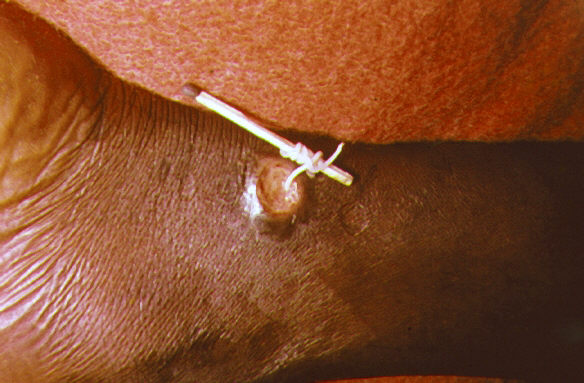By NewsDesk @infectiousdiseasenews
The Carter Center announced today that a provisional total of 53 cases of Guinea worm disease were reported in 2019, up from 28 cases reported in 2018.

Image/CDC
The campaign against the disease, also called dracunculiasis, has taken on additional complexity in recent years with the rise of infections in animals, primarily dogs in Chad.
During 2019, 47 human cases of the disease were reported in Chad, four in South Sudan, one in Angola, and one in Cameroon that is believed to have been imported from Chad.
No human cases have been reported for two years in Ethiopia or four years in Mali, but the two countries are still considered endemic.
As for Guinea worm infections in animals (mainly dogs but also a handful of cats and baboons), 1,973 were detected in Chad, nine in Mali, eight in Ethiopia, and one in Angola; none in South Sudan or Cameroon.
“The time to eradicate Guinea worm is now,” said Adam Weiss, director of the Carter Center Guinea Worm Eradication Program. “To prevent unnecessary suffering, the remaining endemic countries are going all out with every intervention available.”
Interventions to stop transmission include community-based health education, filtering all drinking water, keeping people and animals with emerging Guinea worms from entering water sources, and targeted use of Abate in stagnant water sources.
Considered a neglected tropical disease, Guinea worm disease (dracunculiasis) is usually contracted when people consume water contaminated with tiny crustaceans (copepods) that carry Guinea worm larvae. The larvae mature and mate inside the patient’s body. The male worm dies. After about a year, a meter-long female worm emerges slowly through a painful blister in the skin. Contact with water stimulates the emerging worm to release its larvae into the water and start the process all over again. Guinea worm disease incapacitates people for weeks or months, reducing individuals’ ability to care for themselves, work, grow food for their families, or attend school.
Jimmy Carter: ‘I’d like for the last guinea worm to die before I do’


Guinea worm is one of vector borne diseases, this disease is related poor water sources sanitation.
the only way to to eradicate is to provision safe drink water.